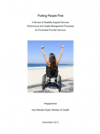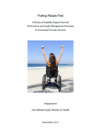This independent review looks at the effectiveness of the current disability support services performance and quality management processes for residential disability providers. The external review panel was asked to evaluate:
- the clarity of the Ministry of Health’s communications to providers on service delivery expectations
- the effectiveness of the Ministry’s processes to identify and manage safety issues
- the efficiency of the Ministry’s processes in responding to the performance of contracted providers
- the effectiveness of the reporting mechanisms and monitoring processes
The review contains 36 recommendations aimed at improving the systems, processes and tools to ensure the safety and wellbeing of people with disabilities.
Methodology
This review was divided into two parts: Phase One, which assessed the effectiveness and efficiency of the Ministry’s performance management systems from an internal perspective; and Phase Two, which sought to identify the changes needed to improve the safety and well-being of people with disabilities.
In Phase One, the panel reviewed documents and conducted interviews with more than thirty staff using open question methodology. The large majority of those interviewed were from Disability Support Services. Five were from National Services Purchasing or other areas of the Ministry of Health.
The aim of this phase was to identify:
- The clarity of the Ministry’s communication to providers on service delivery expectations
- The timeliness of current processes in identifying safety issues and concerns
- The clarity and appropriateness of roles and responsibilities when responding to issues
- The effectiveness and efficiency of performance management processes
- The effectiveness of external monitoring processes and performance reporting mechanisms
- The Ministry’s ability to hold providers to account
In Phase Two, the focus shifted to interviewing people external to the Ministry. This initially focused on members and representatives of the disability community, and then shifted to include providers, external evaluators and evaluation agencies, disability advocates, the Health and Disability Commissioner, the Human Rights Commissioner, and representatives of other Ministries such as ACC, and CYF/MSD.
The underlying question the panel sought to answer during this phase was: what is needed to give real confidence that future decisions and actions will safeguard or improve the well-being of people with disabilities? To answer this question, it sought answers to the following:
- What is working and what is not working for disabled people, and what needs to change?
- How can Developmental Evaluations and Certification audits be further strengthened?
- What other options would complement current monitoring processes and help keep disabled people safe, as well as enable them to speak out?
- What is working and what is not working from the providers’ perspective?
- Can the role of CRMs be re-focused to make better use of this resource?
- How effective is the contract, and the Performance Monitoring Reports?
- What can we learn from other ministries and agencies, and what needs to change to ensure they collaborate more effectively in the future?
- What can we learn from those under the IDCC&R Act and the District Inspector role?
- What can the Ministry learn from the Three Cases: Parklands, Mary Moodie, and Te Roopu?
Following extensive document reviews and interviews, the panel developed its initial findings and recommendations and tested these with key members of the Ministry and people identified as experts in the disability community. It then wrote and compiled the final report.


